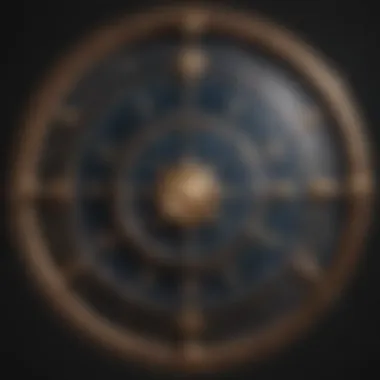The Intricate Link Between Horoscope and Birth Date


Intro
The study of astrology intertwines deeply with the individual’s date of birth, a cornerstone concept that lays the groundwork for understanding horoscopes. This connection offers insights into character, relationships, and life trajectories. For many, this exploration is not just theoretical but profoundly personal, guiding decisions and fostering self-awareness. As we delve into this topic, we will uncover how the zodiac signs – each governed by different planetary influences – contribute to shaping one’s identity and experiences.
Zodiac Profiles
In the heart of astrology lies the zodiac, a band of the sky divided into twelve signs. Each sign corresponds with specific personality traits and characteristics, influenced by celestial events at the time of one’s birth.
Overview of Each Sign
- Aries: The pioneering spirit of the astrological wheel, known for leadership and confidence.
- Taurus: Embodies stability and a love for aesthetics, often associated with a determined nature.
- Gemini: Represents adaptability and communication, bringing versatility and wit.
- Cancer: Nurturing and protective, often focused on home and emotional connection.
- Leo: The heart of creativity and warmth, marked by charisma and self-expression.
- Virgo: Detail-oriented and analytical, seeking order and practicality in life.
- Libra: Symbolizes balance and harmony, with an affinity for relationships and aesthetics.
- Scorpio: Intense and secretive, known for passion and profound emotional depth.
- Sagittarius: The adventurer, driven by curiosity and seeking knowledge and freedom.
- Capricorn: Represents discipline and maturity, with a focus on achievement and responsibility.
- Aquarius: Known for innovation and idealism, often challenging norms.
- Pisces: The intuitive and dreamer, connected to spirituality and compassion.
Personality Traits
Each zodiac sign carries distinct personality traits that emerge based on their elemental associations. For instance, fire signs like Aries, Leo, and Sagittarius embody enthusiasm and dynamism, while earth signs such as Taurus, Virgo, and Capricorn are grounded and pragmatic.
Strengths and Weaknesses
Understanding the strengths and weaknesses associated with each sign can provide deeper insight into personal growth. Fire signs may struggle with impulsiveness but shine in leadership roles. Conversely, earth signs are reliable but may resist change.
Compatibility Insights
A critical aspect of astrology is examining how different signs interact with one another. Compatibility, whether in love, friendship, or work, can often be forecasted through astrological insights.
Love and Relationships
Astrological compatibility plays a significant role in romantic connections. For example, Aries could have a dynamic relationship with Leo due to their shared fire element, while Taurus and Cancer might bond over their mutual need for security and emotional depth.
Friendship Compatibility
Friendships also resonate with zodiac influences. Air signs like Gemini, Libra, and Aquarius can create lively interactions, while water signs, including Scorpio and Pisces, may foster deep emotional ties. Understanding these dynamics can help in forming lasting friendships.
Workplace Dynamics
In professional environments, knowledge of astrological compatibility can enhance team synergy. For instance, earth signs work well with each other, fostering stability, while air signs can bring innovative ideas to collaborative projects.
Astrological Events
Astrology is not static; celestial events can influence readings and personal experiences. Marking these events can guide astrology enthusiasts in interpreting their horoscopes more effectively.
Monthly/Weekly Horoscope Breakdown
Regularly updated horoscopes provide insight into the nuances of daily life. These readings often detail how current planetary positions affect personal and collective experiences.
Notable Celestial Events
Occurrences like lunar eclipses or retrograde cycles can significantly impact individuals, often challenging existing circumstances or providing new opportunities for growth.
How to Prepare for Astrological Shifts
Being aware of these shifts allows individuals to brace for change or capitalize on positive energy. Practical steps include setting intentions, reassessing goals, and embracing flexibility in planning.
Understanding your horoscope is not merely about predicting the future; it is about recognizing the patterns that guide your life’s path.
Astrology offers a profound lens for understanding oneself and navigating life’s uncertainties. Through the detailed exploration of zodiac signs, compatibility insights, and the impacts of celestial events, individuals can cultivate a richer understanding of their place in the cosmos.
Preamble to Horoscopes


Astrology has captivated human beings for centuries. As we delve into the topic of horoscopes, we uncover a significant connection between an individual’s date of birth and their astrological profile. Horoscopes serve as more than just a daily or monthly guideline; they are a roadmap of potential traits, behaviors, and patterns influenced by celestial movements.
Definition of Horoscopes
A horoscope is essentially a symbolic representation of the positions of celestial bodies at the time of one's birth. It is calculated based on the date, time, and place of birth, providing insights into personal characteristics and life pathways. This interpretation relies heavily on zodiac signs, which are segments of the celestial sphere, divided into twelve distinct categories, each reflecting unique traits and tendencies.
Horoscopes encompass elements such as the sun sign, moon sign, and rising sign, which together influence a person's overall astrological makeup. The sun sign indicates one's core identity, while the moon sign reflects emotional depth. The rising sign, or ascendant, highlights how individuals express themselves to the outer world. Understanding these components is crucial for comprehensively interpreting one's horoscope and its implications.
Historical Context of Astrology
Astrology is rooted in ancient civilizations. The Babylonians are often credited with establishing the foundation of astrological practices around the second millennium BCE. They meticulously charted celestial bodies and noted their cyclic patterns, linking them to terrestrial events. This laid the groundwork for a complex system of astrology that has evolved over the centuries.
Various cultures, including the Greeks, Romans, and Chinese, further developed astrological traditions by integrating their mythology and philosophies with celestial observations. For example, Plato and Ptolemy significantly influenced Western astrology and established many principles still in use today.
The historical progression of astrology demonstrates its enduring presence. From ancient texts to modern astrological apps, the horoscopes maintain their relevance in understanding human behavior and choice. It's important to note how the evolution of astrology reflects humanity's ongoing quest to comprehend the universe and our place within it.
“Astrology is the study of cycles that helps us reflect on the events and characteristics of life and our connection to the cosmos.”
As we further examine the interplay between horoscope readings and an individual’s date of birth, we will engage in detailed exploration of zodiac signs and their significant influence on personality traits and life events.
Understanding the Zodiac Signs
Understanding the zodiac signs is fundamental when exploring the connection between horoscopes and an individual's date of birth. Zodiac signs serve as the foundation of astrology, as they provide insight into the characteristics and traits that shape our personalities and behaviors. Each sign corresponds to a specific time frame within the astrological calendar, creating a direct link between the date of birth and the corresponding zodiac sign. By comprehending the zodiac signs, one can better appreciate how celestial movements influence various aspects of life.
Overview of Zodiac Signs
Zodiac signs are divided into twelve distinct divisions, each representing different qualities and attributes. The signs originate from the constellations that the sun passes through during its yearly journey. Here are the twelve zodiac signs:
- Aries (March 21 - April 19)
- Taurus (April 20 - May 20)
- Gemini (May 21 - June 20)
- Cancer (June 21 - July 22)
- Leo (July 23 - August 22)
- Virgo (August 23 - September 22)
- Libra (September 23 - October 22)
- Scorpio (October 23 - November 21)
- Sagittarius (November 22 - December 21)
- Capricorn (December 22 - January 19)
- Aquarius (January 20 - February 18)
- Pisces (February 19 - March 20)
Each sign exhibits unique characteristics, making it important to recognize how these traits may correlate with individuals’ behaviors and interactions.
Significance of Birth Dates
Birth dates hold significant weight in astrology. They determine not only the sun sign but also potentially influence one's moon sign and rising sign, which add layers to personality understanding. Astrologers believe that knowing one's birth date helps to reveal inherent traits, tendencies, and emotional needs that shape a person's life path.
Understanding the specific astrological influences associated with one’s birth date can enrich personal insights and lead to productive self-awareness. For example, someone born on the cusp of two signs might resonate with traits from both, allowing for a nuanced view of their personality.
Personality Traits by Zodiac Sign
Each zodiac sign brings forward specific personality traits. Following are outlined key traits typically associated with each sign:
- Aries: Energetic, adventurous, and assertive.
- Taurus: Reliable, patient, and practical.
- Gemini: Curious, adaptable, and witty.
- Cancer: Nurturing, intuitive, and sensitive.
- Leo: Confident, creative, and charismatic.
- Virgo: Analytical, meticulous, and helpful.
- Libra: Diplomatic, social, and graceful.
- Scorpio: Passionate, resourceful, and intense.
- Sagittarius: Optimistic, open-minded, and enthusiastic.
- Capricorn: Disciplined, determined, and responsible.
- Aquarius: Innovative, independent, and humanitarian.
- Pisces: Compassionate, artistic, and empathetic.
These traits elucidate how the zodiac signs can guide understanding of behavior, enhancing personal growth and interaction with others.
Understanding the intricacies of each zodiac sign provides valuable insights into personal dynamics, enhancing self-awareness and guiding relationships.
The Mechanics of Horoscope Interpretation
Understanding the mechanics of horoscope interpretation is crucial in astrology. Each element of a horoscope, from planetary positions to zodiac signs, contributes to a nuanced understanding of an individual's character and life path. This section explores how these components work together to create a comprehensive picture for the reader. By delving into astrological elements, the influence of planets, and the significance of houses, we can better grasp how horoscopes impact personal insights and decision-making.
Astrological Elements
Astrological elements are the foundational building blocks of astrology. There are four primary elements: Fire, Earth, Air, and Water. Each of these elements embodies distinctive qualities, and they influence the characteristics associated with the zodiac signs.
- Fire: Represents enthusiasm, creativity, and dynamism. Signs like Aries, Leo, and Sagittarius fall under this category. Individuals with dominant fire elements are often seen as passionate and full of energy.
- Earth: Symbolizes practicality, stability, and materialism. Taurus, Virgo, and Capricorn are earth signs. Those influenced by earth often value security and realistic approaches.
- Air: Denotes intellect, communication, and social connections. Gemini, Libra, and Aquarius belong to the air element. Air signs tend to be friendly and great thinkers.
- Water: Reflects emotion, intuition, and sensitivity. Cancer, Scorpio, and Pisces are water signs. Those with strong water influence are often regarded as empathetic and compassionate.


Each individual’s horoscope is shaped by the balance of these elements, providing insight into their intrinsic nature and how they perceive the world around them.
Influence of Planets
Planets play a significant role in astrological interpretation. Each planet governs specific traits and influences various aspects of a person's life. The primary planets and their meanings include:
- Sun: Represents core identity and self-expression.
- Moon: Governs emotions, instincts, and inner self.
- Mercury: Influences communication and intellect.
- Venus: Relates to love, beauty, and harmony.
- Mars: Linked to action, aggression, and desire.
- Jupiter: Associated with growth, fortune, and expansion.
- Saturn: Represents discipline, responsibility, and limitations.
- Uranus: Relates to innovation, rebellion, and sudden changes.
- Neptune: Governs dreams, intuition, and spirituality.
- Pluto: Associated with transformation, power, and regeneration.
Each planet's position at the time of one’s birth affects the personality traits and energies the individual exhibits. For instance, a strong Venus influence may lead to an individual being more relational and loving. Thus, understanding these influences aids in accurate horoscope interpretation and personal insight.
Houses in Astrology
Astrological houses refer to distinct areas in one’s horoscope that signify different life themes. There are twelve houses, each representing various dimensions of life, such as career, relationships, and home.
- First House: Self and appearance.
- Second House: Material possessions and values.
- Third House: Communication and intellect.
- Fourth House: Home and family.
- Fifth House: Creativity and recreation.
- Sixth House: Health and service.
- Seventh House: Partnerships and marriage.
- Eighth House: Transformation and shared resources.
- Ninth House: Philosophy and travel.
- Tenth House: Career and reputation.
- Eleventh House: Friendships and aspirations.
- Twelfth House: Spirituality and the subconscious.
The alignment of planets within these houses informs the reading of an individual’s horoscope, revealing how different life experiences may manifest. By analyzing these houses, astrologers help individuals understand the specific themes and challenges they may face in life.
Each component, whether elemental, planetary, or situational within houses, adds layers of meaning to an astrological chart. By analyzing these factors, individuals can gain deeper insights into their behaviors and destinies.
Free Horoscope Services
The availability of free horoscope services is a significant topic within this article. Many people are curious about astrology but may not wish to invest much time or money at the beginning. Free horoscope services provide an accessible entry point into the world of astrology. They allow individuals to explore their zodiac signs and understand their potential characteristics without any financial commitment. This ease of access can demystify astrology and encourage more individuals to consider how it relates to their lives and decisions.
Availability of Free Horoscopes
Various platforms offer free horoscope readings. Websites like Astrology.com provide daily, weekly, and monthly horoscopes at no cost. Additionally, some apps allow users to input their birth date and obtain a personalized reading. This immediacy in accessing horoscopes increases the interest in astrology and enhances personal exploration. Free resources can help one become familiar with astrological terms and ideas, setting the foundation for deeper learning later.
How to Access Free Horoscope Readings
Accessing free horoscope readings is straightforward. Here are some common methods:
- Websites: Many astrology-focused websites offer comprehensive sections dedicated to free horoscope readings.
- Mobile Apps: Several apps on smartphone platforms provide horoscopes based on user input. Popular apps include Co-Star and Astromatrix.
- Social Media: Platforms like Facebook and Instagram may host pages or accounts that share daily horoscopes or insights based on astrology.
Users simply need to provide their date of birth and, in some cases, their time and place of birth for a more detailed analysis. This information is used to calculate zodiac signs and create personalized readings.
Limitations of Free Services
While free horoscope services are beneficial in many ways, they also come with limitations that users should keep in mind:
- Generalized Interpretations: Free readings often lack the nuance found in personalized, professional astrology services. They may not account for individual circumstances.
- Accuracy: The accuracy of free online readings can vary greatly, with some sources offering more reliable interpretations than others.
- Limited Depth: Free services may provide basic information but often omit advanced astrological concepts like house placements and aspects between planets, which can influence interpretations significantly.
"Understanding the limitations of free services is crucial to fully appreciate their value and potential shortcomings."
Astrology and Personal Growth
Astrology serves as a fascinating framework for exploring one's personal growth. It provides a roadmap that links celestial influences to everyday experiences. By understanding our horoscopes, we can gain insight into our strengths and weaknesses. This is particularly relevant in self-reflection and decision-making contexts. Engaging with astrology offers pathways for self-improvement, helping individuals navigate life's complexities with more confidence.
Using Horoscope for Self-Reflection
Self-reflection is a cornerstone of personal development. Horoscopes can guide this introspective journey. Each zodiac sign has characteristics that resonate with specific aspects of our personalities. For example, those born under Aries could reflect on their assertiveness, while Pisces might explore their emotional depth. This process encourages individuals to ask difficult questions about their motivations and behaviors. When we align our personal traits with astrological insights, it allows for a more profound self-awareness.
- Identify Strengths: Understanding your zodiac sign can illuminate innate talents and skills.
- Recognize Weaknesses: It can also help in identifying challenges or areas for growth.
- Track Progress Over Time: Regular horoscope readings can serve as checkpoints for personal growth.
Utilizing horoscopes in this way does not dictate actions but encourages intentionality in choices. Individuals can map out their life journeys based on their astrological profiles, adapting them as necessary.
Horoscope as a Decision-Making Tool


Astrology can play a significant role in enhancing decision-making abilities. By looking at planetary movements and sign influences, individuals can gain clarity on various life choices. When making critical decisions, it might be beneficial to consider planetary alignments and their implications.
Compatibility and Relationships
Understanding compatibility in astrology offers significant insights into personal relationships. Astrology suggests that your date of birth holds essential clues regarding your romantic and platonic connections. The influence of zodiac signs creates patterns for interaction and emotional responses. The synergy between different signs can dictate the ease or challenges experienced in relationships.
Zodiac Compatibility Overview
Zodiac compatibility is based on the relationship between different signs. Some signs naturally resonate with each other due to shared elemental attributes. The four elements—fire, earth, air, and water—play a crucial role in determining how signs connect.
- Fire Signs (Aries, Leo, Sagittarius) often ignite passion and enthusiasm in relationships. They tend to thrive together, bringing energy into partnerships.
- Earth Signs (Taurus, Virgo, Capricorn) usually provide stability and practicality. They are well-suited for each other, fostering a nurturing environment.
- Air Signs (Gemini, Libra, Aquarius) appreciate intellectual exchanges. Their relationships flourish through communication and understanding.
- Water Signs (Cancer, Scorpio, Pisces) connect on an emotional level. Their depth and sensitivity often create profound bonds.
Some of the most compatible pairings include:
- Aries and Leo
- Taurus and Virgo
- Gemini and Libra
- Cancer and Pisces
The dynamics of these relationships reflect not only affection but also challenges that can arise. Understanding zodiac connections can lead to a deeper appreciation of each partner's needs and response styles.
Factors in Relationship Compatibility
Several elements affect relationship compatibility beyond the zodiac alone. Here are key factors to consider:
- Moon Signs: The moon sign influences emotions and inner experiences. Compatibility between moon signs can be crucial for emotional fulfillment.
- Ascendant/ Rising Signs: This sign reflects how others perceive you. A match between rising signs can indicate a harmonious initial attraction.
- Planetary Positions: Consideration of Venus and Mars positions adds layers, as they govern love and desire, respectively.
- Composite Charts: These charts focus on the relationship as a whole. They analyze both partners’ planetary placements to predict the partnership's outcome.
Having knowledge about these factors can empower individuals to navigate their relationships thoughtfully. It prompts self-awareness and highlights areas of growth. Each relationship is unique, shaped by numerous astrological influences. The more a person learns about their own birth chart and that of their partner, the more equipped they are to build a fulfilling connection.
Astrological compatibility provides a framework for understanding partner dynamics. It does not dictate destiny but prepares individuals for insightful interactions.
The Future of Astrology
Astrology continues to capture the imagination of many, and its future holds vast possibilities. The connection between horoscopes and an individual's date of birth persists as a focal point for consumers seeking deeper understanding of themselves and their life path. As society shifts toward a more holistic approach to well-being, astrology's relevance is increasingly recognized. This section explores various trends and technologies shaping the future of astrology.
Trends in Astrological Practices
Astrological practices are evolving. They adapt to cultural shifts and technological advances. Here are some emerging trends:
- Increased Personalization: Astrologers now provide more tailored readings. There is a focus on individual experiences, particularly regarding how a person's astrological influences correlate with their unique life situations.
- Holistic Integrations: Many practitioners combine astrology with other holistic modalities. This might include tarot reading, meditation, or even wellness coaching.
- Astrology in Mainstream Culture: Astrological content is becoming more prevalent in various media. It is not uncommon to find astrologers featured in mainstream publications or podcasts, bringing astrology to a broader audience.
Astrology enthusiasts are looking for depth. They wish to explore how they can make actionable changes based on their readings. This trend signals a generational shift towards using astrology as a positive influence in everyday life.
Technology and Astrology
Technology is reshaping how astrology is practiced and accessed. Various tools and platforms enhance traditional practices:
- Astrology Apps: There are multiple apps available, such as Co–Star and The Pattern, that provide instant access to personalized horoscopes and readings.
- Online Services: Websites offer detailed horoscope readings and consultations, allowing users to receive insights without geographical barriers. This accessibility enriches the astrology community.
- Social Media: Platforms like Instagram and Facebook have become essential for astrologers to share insights and reach new audiences. Engaging visuals and bite-sized information make astrology more approachable and relatable.
Astrology is becoming more democratic as technology bridges gaps. In future, it may become increasingly data-driven, analyzing larger trends backed by planetary movements while maintaining individual relevance.
Finale
Summarizing Insights
In this exploration of horoscopes and their connection to date of birth, we have seen how astrology is not merely superstition but a structured system of insights. Each zodiac sign represents unique personality traits, preferences, and tendencies shaped by the celestial influences at the time of one's birth. Understanding these connections allows individuals to reflect on their behaviors, relationships, and choices more clearly.
An individual’s date of birth is crucial in creating a personalized horoscope. The alignment of planets and zodiac signs at this moment provides specific insights that can influence life's path. Such knowledge enables individuals to understand their motivations better and the actions they take in various situations.
Furthermore, the synthesis of zodiac signs with planetary aspects presents a nuanced view of life. As discussed, the position of planets in various houses also contributes significantly to life events and emotional well-being. Ultimately, this information serves as a guide for personal growth and understanding.
Encouragement for Personal Exploration
As we conclude, it is crucial to encourage readers to delve into their horoscopes with curiosity. Astrology offers a pathway to self-discovery. By examining one’s zodiac sign and the implications of their birth date, individuals can start to understand their inherent qualities and how they interact with the world. This introspection can lead to enhanced decisions in life, career, and relationships.
Consider exploring various astrological resources. Books, websites, and communities focused on astrology can provide extensive guidance on this subject. Engage with others who share an interest in astrology through forums such as Reddit or dedicated Facebook groups. Sharing experiences in these settings can enrich one's insights and offer diverse perspectives.
Astrology, when viewed as a tool for personal reflection, can significantly enhance one’s understanding of self and the environment.



